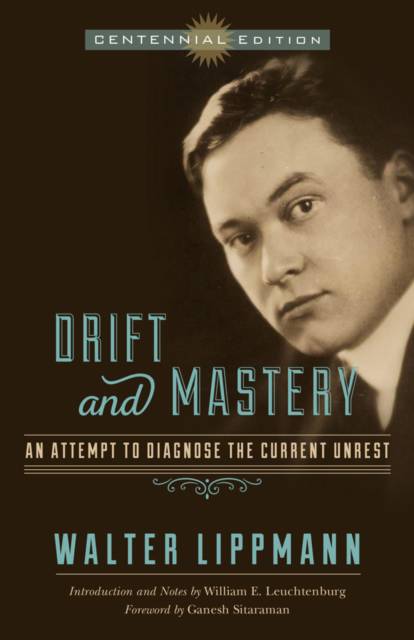
Bedankt voor het vertrouwen het afgelopen jaar! Om jou te bedanken bieden we GRATIS verzending (in België) aan op alles gedurende de hele maand januari.
- Afhalen na 1 uur in een winkel met voorraad
- In januari gratis thuislevering in België
- Ruim aanbod met 7 miljoen producten
Bedankt voor het vertrouwen het afgelopen jaar! Om jou te bedanken bieden we GRATIS verzending (in België) aan op alles gedurende de hele maand januari.
- Afhalen na 1 uur in een winkel met voorraad
- In januari gratis thuislevering in België
- Ruim aanbod met 7 miljoen producten
Zoeken
€ 37,45
+ 74 punten
Uitvoering
Omschrijving
In 1914, a brilliant young political journalist published a book arguing that the United States had entered a period of "drift"-a lack of control over rapidly changing forces in society. He highlighted the tensions between expansion and consolidation, traditionalism and progressivism, and emotion and rationality. He wrote to convince readers that they could balance these tensions: they could be organized, efficient, and functional without sacrificing impulse, choice, or liberty. Mastery over drift is attainable, Walter Lippmann argued, through diligent attention to facts and making active choices. Democracy, Lippman wrote, is "a use of freedom, an embrace of opportunity."
Lippman's Drift and Mastery became one of the most important and influential documents of the Progressive Movement. It remains a valuable text for understanding the political thought of early twentieth-century America and a lucid exploration of timeless themes in American government and politics. Distinguished historian Walter Leuchtenberg's 1986 introduction and notes are retained in this edition. Ganesh Sitaraman, who has provided a foreword for this centennial edition, suggests that Lippmann's classic still has much to say to twenty-first-century progressives. The underlying solutions for our time, he believes, are similar to those of Lippman's era. Sitaraman contends that American society can regain mastery over drift by reforming finance and reducing inequality, by rethinking the relationship between corporations and workers, and by embracing changes in social life.
Lippman's Drift and Mastery became one of the most important and influential documents of the Progressive Movement. It remains a valuable text for understanding the political thought of early twentieth-century America and a lucid exploration of timeless themes in American government and politics. Distinguished historian Walter Leuchtenberg's 1986 introduction and notes are retained in this edition. Ganesh Sitaraman, who has provided a foreword for this centennial edition, suggests that Lippmann's classic still has much to say to twenty-first-century progressives. The underlying solutions for our time, he believes, are similar to those of Lippman's era. Sitaraman contends that American society can regain mastery over drift by reforming finance and reducing inequality, by rethinking the relationship between corporations and workers, and by embracing changes in social life.
Specificaties
Betrokkenen
- Auteur(s):
- Uitgeverij:
Inhoud
- Aantal bladzijden:
- 206
- Taal:
- Engels
Eigenschappen
- Productcode (EAN):
- 9780299304843
- Verschijningsdatum:
- 13/05/2015
- Uitvoering:
- Paperback
- Formaat:
- Trade paperback (VS)
- Afmetingen:
- 137 mm x 213 mm
- Gewicht:
- 181 g

Alleen bij Standaard Boekhandel
+ 74 punten op je klantenkaart van Standaard Boekhandel
Beoordelingen
We publiceren alleen reviews die voldoen aan de voorwaarden voor reviews. Bekijk onze voorwaarden voor reviews.









